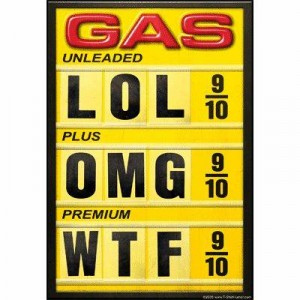The Gas Price Blame Game

Every year when gas prices rise, politicians and pundits like to play the blame game. On Fox & Friends, Louisiana Gov. Bobby Jindal blamed the Obama administration’s “radical environmental ideology” for high gas prices. (The latest Bloomberg poll, however, showed that most Americans do not blame the White House.) The Christian Science Monitor points the finger at India.
It might be reassuring to think that someone out there is responsible for our pain at the pump, but it’s not helpful. Americans need serious solutions that will address the root of the problem, and not a bunch of finger-pointing.
The hard truth is that America does not have the resources to control the long-term price of oil. We have drilled more oil wells than any nation on earth. The number of oil rigs in operation in the U.S. has quadrupled since 2008, and we are producing more oil now than we have in nearly a decade.
And still, gas prices are rising.
Despite what you may hear from the Big Oil lobby and its allies, more drilling doesn’t mean lower gas prices. More drilling means more profits for Big Oil–$7.7 billion for BP in the last quarter alone, $9.4 billion for Exxon Mobil. (Big Oil also enjoys about $4 billion each year in taxpayer subsidies.) More drilling means risking more economic and environmental devastation on our coasts.
Getting more oil from the Keystone XL tar sands pipeline won’t bring down gas prices, either. TransCanada, the company behind the pipeline, has admitted that Keystone XL would increase the price Americans pay for Canadian oil by up to $4 billion a year – an especially steep cost when you consider that digging up tar sands from ancient forests in Canada and burning the oil from it in our cars is more carbon-intensive than any other fossil fuel source. It would raise gasoline prices in the Midwest by cutting out Midwestern refineries. Canada wants Keystone XL in order to get access to overseas markets, not to sell more oil to us.
If Canadian companies wanted to deliver more oil to the United States, they could use existing pipelines. They’re running half-empty.
So how do we avoid paying through the nose at the pump? By loosening the ties that bind us to oil and gas. By breaking our dependence on oil, a resource whose price and availability, as any economist will tell you, we cannot control. By creating choices that give Americans true freedom of energy.
New fuel efficiency standards are an important step toward that freedom. The administration’s decision to increase new car mileage standards to 54.5 miles per gallon by 2025 will save the average driver $4,400 over the life of the vehicle. That’s money in our pockets, not Big Oil’s.
Smart investments in transit and infrastructure will give more people alternatives to paying at the pump, while at the same time easing traffic on congested roads. High-tech buses, light rail systems, safe sidewalks and bike paths, as well sustainable fuels, all give people more ways to get where they need to go, without being dependent on gasoline.
Experts say we can blame unrest in the Middle East and increasing global demand for driving up the price of oil. We cannot control global oil supply, but we can reduce our need for oil. This year, Americans are ready for a clean energy plan that will break us out of gas price gridlock: better cars, better fuels, and more transportation options.
[Photo By marsmet524]

